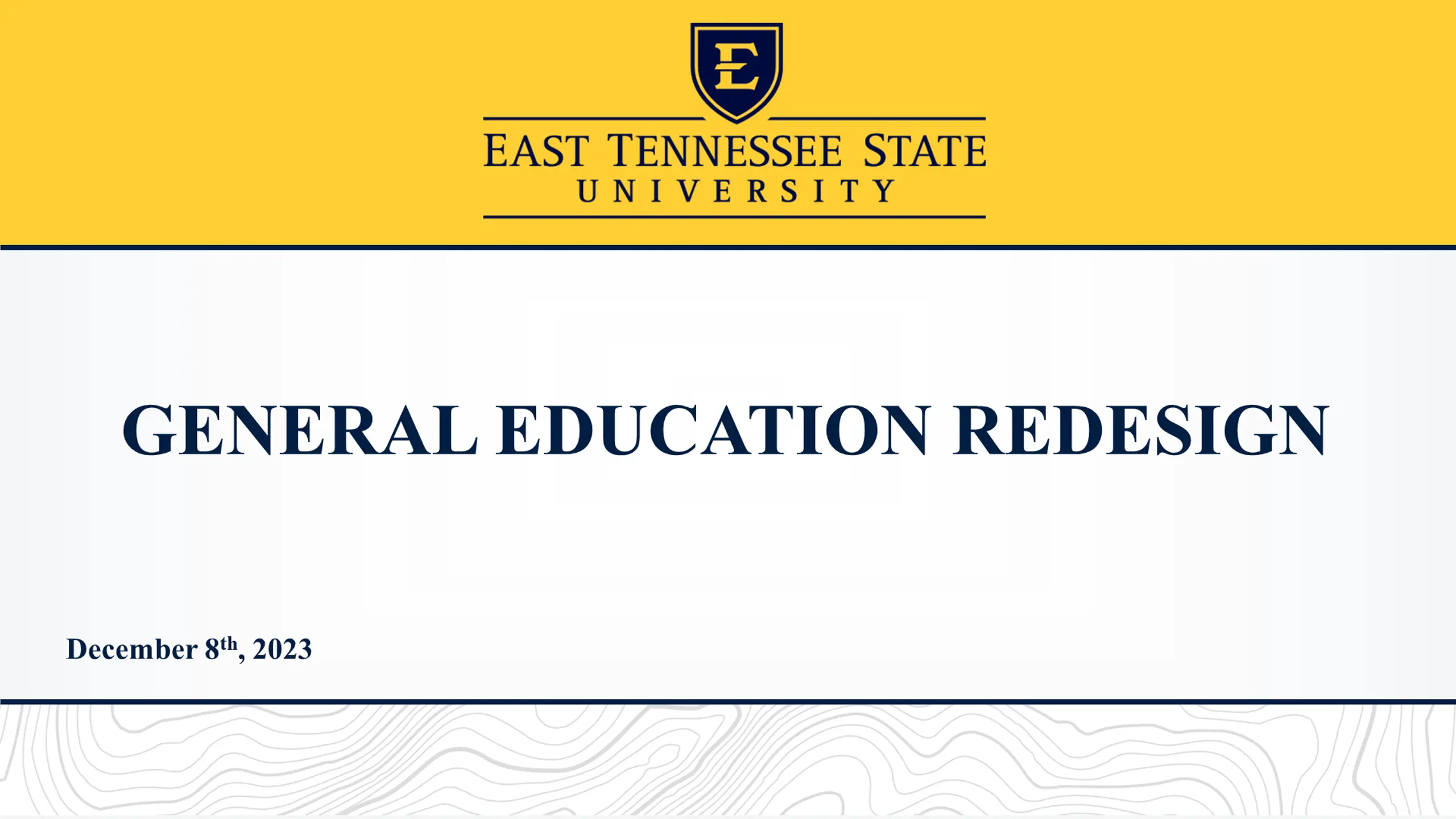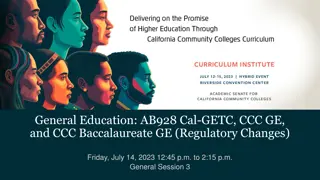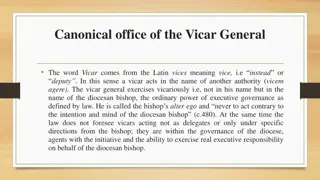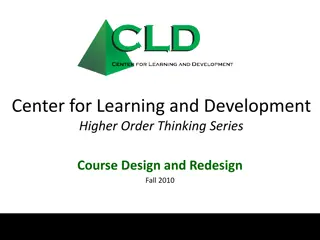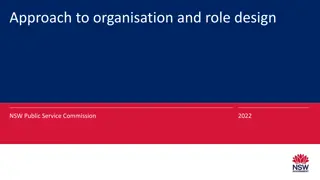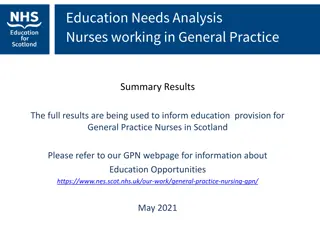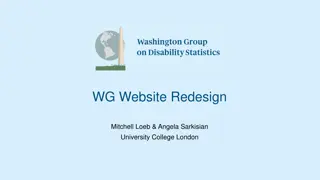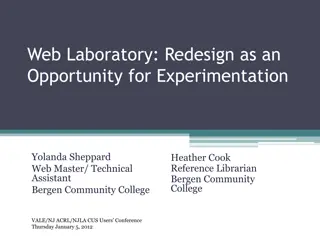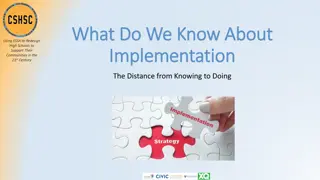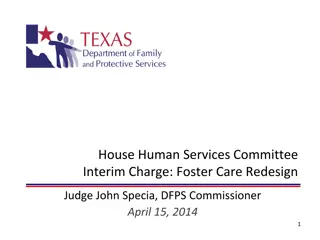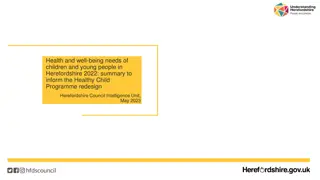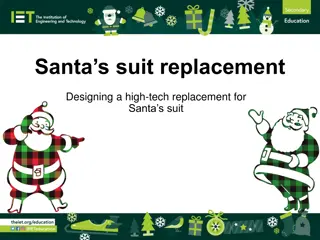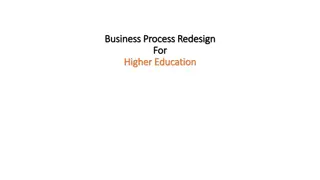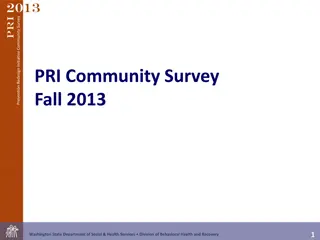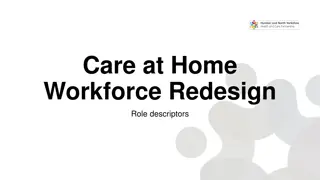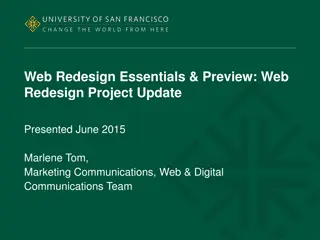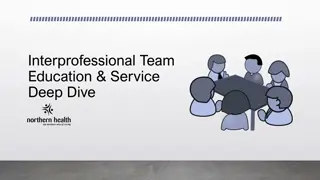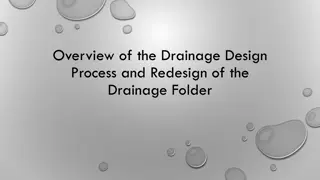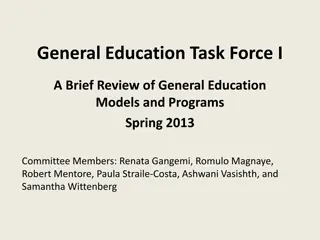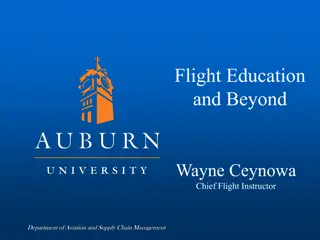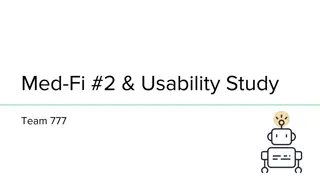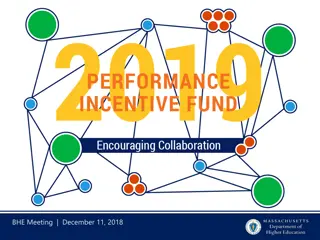General Education Redesign
A proposal to revise the general education curriculum with a focus on competency-based learning, transparency, integration, flexibility, and high-impact teaching practices. Includes alternative models for strengthening foundations.
Download Presentation

Please find below an Image/Link to download the presentation.
The content on the website is provided AS IS for your information and personal use only. It may not be sold, licensed, or shared on other websites without obtaining consent from the author.If you encounter any issues during the download, it is possible that the publisher has removed the file from their server.
You are allowed to download the files provided on this website for personal or commercial use, subject to the condition that they are used lawfully. All files are the property of their respective owners.
The content on the website is provided AS IS for your information and personal use only. It may not be sold, licensed, or shared on other websites without obtaining consent from the author.
E N D
Presentation Transcript
GENERAL EDUCATION REDESIGN December 8th, 2023
1. Background 2. Process 3. Proposal 4. Feedback 5. Next steps Agenda
Background Nation-wide trend to rethink General Education Confusion about purpose and value of general education Retention data ETSU 125 - Chapter II recommendation Faculty Senate GEAC
Our literature review suggested: 1. Competency rather than content-based 2. Transparency 3. Integration 4. Flexibility 5. High-Impact Teaching Practices Process
Proposal A STRENGTHENING FOUNDATIONS (15-16) This was the proposal agreed upon by the task force in November 2023. ENGL 1010 and ENGL 1020 (6) Quantitative Reasoning (3-4) Critical Thinking (3) First-Year Experience (3) UNDERSTANDING NATURAL AND SOCIAL WORLDS (10-11) Aside from minor changes, this was the model shared with ETSU campus groups in September and October. Natural Sciences (at least 4) Social/Behavioral Sciences (at least 3) EXPLORING CONNECTIONS (9) History (at least 3) Humanities outside of History (at least 3) CULTIVATING ARTISTIC AWARENESS (3) GROWING AS AN INDIVIDUAL AND GLOBAL CITIZEN (3-4)
Proposal B STRENGTHENING FOUNDATIONS (15-16) In early December, the Provost suggested that the task force provide an alternative model that required a course in oral communication. On December 6th, the task force met and agreed that the best way to include oral communication was to remove first-year experience. ENGL 1010 and ENGL 1020 (6) Quantitative Reasoning (3-4) Critical Thinking (3) Oral Communication (3) UNDERSTANDING NATURAL AND SOCIAL WORLDS (10-11) Natural Sciences (at least 4) Social/Behavioral Sciences (at least 3) EXPLORING CONNECTIONS (9) History (at least 3) Humanities outside of History (at least 3) CULTIVATING ARTISTIC AWARENESS (3) GROWING AS AN INDIVIDUAL AND GLOBAL CITIZEN (3-4)
Proposal STRENGTHENING FOUNDATIONS (15-16) To avoid the impression that on any model students can choose between FYE and oral communication, we ve replaced the final component of Strengthening Foundations with question marks. ENGL 1010 and ENGL 1020 (6) Quantitative Reasoning (3-4) Critical Thinking (3) ??????? (3) UNDERSTANDING NATURAL AND SOCIAL WORLDS (10-11) Natural Sciences (at least 4) Social/Behavioral Sciences (at least 3) EXPLORING CONNECTIONS (9) History (at least 3) Humanities outside of History (at least 3) CULTIVATING ARTISTIC AWARENESS (3) GROWING AS AN INDIVIDUAL AND GLOBAL CITIZEN (3-4)
Comparison of current and proposed models Current (SCH) 6 3-4 Proposal (SCH) 6 3-4 0-9 3-9 3 3-9 0-9 0-9 3 4-12 3-9 Written Composition Mathematics Oral Communication 3 Critical Thinking History Literature Humanities (outside Literature & History) Fine Arts Natural Sciences Social and Behavioral Sciences 0 6 3 3 3 8 6
CRITICAL THINKING New categories Critical Thinking is a nebulous term Science denial, revisionist history, misinformation, post-truth era, echo chambers, media bias, created crises Evidence concerning high-road transfer Focus on Cognitive biases Ethical, economic, social issues surrounding use of information and evidence Credibility of sources Argument structure/evaluation/fallacies Benefits Foundation for success in all courses Integrate learning from distinct disciplines Improve cultural judgment CCTST
FIRST-YEAR EXPERIENCE New categories US DoE Institute of Education Sciences study suggests positive effects for: retention First-year experience is not part of Proposal B. degree attainment academic achievement Because FYE courses could be new to general education we re including some information about the benefits of a well- designed, academically rigorous, first- year experience course. Effective retention relies on: Educational commitment to all student types Developing social and intellectual communities Range of learning/community-building strategies Holistic approach Instruction in why education matters Strategies for learning ETSU resources Academically rigorous
New categories GROWING AS AN INDIVIDUAL AND GLOBAL CITIZEN The general education curriculum at East Tennessee State University inspires students to fulfill their potential as socially responsible, informed, and self-aware members of society. General education teaches us how to build communities and better understand our roles within them. Productive citizens are resilient and self-aware they strive to maximize their physical, financial, emotional, and social wellness. They look outwards as well as inward, developing awareness of the differences between diverse cultures and their significance. They interact respectfully with people from diverse communities and backgrounds and work towards creating a more equitable world. 1. Identify and explain the historical, cultural, linguistic, economic, political, scientific, and/or social interconnections and experiences that characterize the contemporary world. 2. Analyze and reflect on the ways in which historical, cultural, linguistic, economic, political, scientific, and/or social interconnections and experiences affect people individually and as groups. 3. Apply concepts of physical, mental, psychosocial, and/or financial wellness to develop a strong sense of self to become an engaged citizen in a complex society.
Proposal STRENGTHENING FOUNDATIONS (15-16) Competency-based ENGL 1010 and ENGL 1020 (6) Quantitative Reasoning (3-4) Critical Thinking (3) ??????? (3) UNDERSTANDING NATURAL AND SOCIAL WORLDS (10-11) Natural Sciences (at least 4) Social/Behavioral Sciences (at least 3) EXPLORING CONNECTIONS (9) History (at least 3) Humanities outside of History (at least 3) CULTIVATING ARTISTIC AWARENESS (3) GROWING AS AN INDIVIDUAL AND GLOBAL CITIZEN (3-4)
GENERAL EDUCATION CATEGORIES FIRST-YEAR EXPERIENCE? WRITING COMPOSITION (plus ORAL?) THE SIX COMPETENCIES QUANTITATIVE REASONING THINK CRITICALLY CRITICAL THINKING COMMUNICATE EFFECTIVELY NATURAL SCIENCES UNDERSTAND NATURAL AND SOCIAL WORLDS CULTIVATE ARTISTIC AWARENESS SOCIAL SCIENCES COLLABORATE AND BUILD COMMUNITY HISTORY GROW AND A RESPONSIBLE AND PRODUCTIVE CITIZEN HUMANITIES (including Literature) CULTIVATING ARTISTIC AWARENESS GROWING AS AN INDIVIDUAL AND GLOBAL CITIZEN
GENERAL EDUCATION CATEGORIES FIRST-YEAR EXPERIENCE? WRITING COMPOSITION (plus ORAL?) THE SIX COMPETENCIES QUANTITATIVE REASONING THINK CRITICALLY CRITICAL THINKING COMMUNICATE EFFECTIVELY NATURAL SCIENCES UNDERSTAND NATURAL AND SOCIAL WORLDS CULTIVATE ARTISTIC AWARENESS SOCIAL SCIENCES COLLABORATE AND BUILD COMMUNITY HISTORY GROW AND A RESPONSIBLE AND PRODUCTIVE CITIZEN HUMANITIES (including Literature) CULTIVATING ARTISTIC AWARENESS GROWING AS AN INDIVIDUAL AND GLOBAL CITIZEN
GENERAL EDUCATION CATEGORIES FIRST-YEAR EXPERIENCE? WRITING COMPOSITION (plus ORAL?) THE SIX COMPETENCIES QUANTITATIVE REASONING THINK CRITICALLY CRITICAL THINKING COMMUNICATE EFFECTIVELY NATURAL SCIENCES UNDERSTAND NATURAL AND SOCIAL WORLDS CULTIVATE ARTISTIC AWARENESS SOCIAL SCIENCES COLLABORATE AND BUILD COMMUNITY HISTORY GROW AND A RESPONSIBLE AND PRODUCTIVE CITIZEN HUMANITIES (including Literature) CULTIVATING ARTISTIC AWARENESS GROWING AS AN INDIVIDUAL AND GLOBAL CITIZEN
GENERAL EDUCATION CATEGORIES FIRST-YEAR EXPERIENCE? WRITING COMPOSITION (plus ORAL?) THE SIX COMPETENCIES QUANTITATIVE REASONING THINK CRITICALLY CRITICAL THINKING COMMUNICATE EFFECTIVELY NATURAL SCIENCES UNDERSTAND NATURAL AND SOCIAL WORLDS CULTIVATE ARTISTIC AWARENESS SOCIAL SCIENCES COLLABORATE AND BUILD COMMUNITY HISTORY GROW AND A RESPONSIBLE AND PRODUCTIVE CITIZEN HUMANITIES (including Literature) CULTIVATING ARTISTIC AWARENESS GROWING AS AN INDIVIDUAL AND GLOBAL CITIZEN
GENERAL EDUCATION CATEGORIES FIRST-YEAR EXPERIENCE? WRITING COMPOSITION (plus ORAL?) THE SIX COMPETENCIES QUANTITATIVE REASONING THINK CRITICALLY CRITICAL THINKING COMMUNICATE EFFECTIVELY NATURAL SCIENCES UNDERSTAND NATURAL AND SOCIAL WORLDS CULTIVATE ARTISTIC AWARENESS SOCIAL SCIENCES COLLABORATE AND BUILD COMMUNITY HISTORY GROW AND A RESPONSIBLE AND PRODUCTIVE CITIZEN HUMANITIES (including Literature) CULTIVATING ARTISTIC AWARENESS GROWING AS AN INDIVIDUAL AND GLOBAL CITIZEN
GENERAL EDUCATION CATEGORIES FIRST-YEAR EXPERIENCE? WRITING COMPOSITION (plus ORAL?) THE SIX COMPETENCIES QUANTITATIVE REASONING THINK CRITICALLY CRITICAL THINKING COMMUNICATE EFFECTIVELY NATURAL SCIENCES UNDERSTAND NATURAL AND SOCIAL WORLDS CULTIVATE ARTISTIC AWARENESS SOCIAL SCIENCES COLLABORATE AND BUILD COMMUNITY HISTORY GROW AND A RESPONSIBLE AND PRODUCTIVE CITIZEN HUMANITIES (including Literature) CULTIVATING ARTISTIC AWARENESS GROWING AS AN INDIVIDUAL AND GLOBAL CITIZEN
GENERAL EDUCATION CATEGORIES FIRST-YEAR EXPERIENCE? WRITING COMPOSITION (plus ORAL?) THE SIX COMPETENCIES QUANTITATIVE REASONING THINK CRITICALLY CRITICAL THINKING COMMUNICATE EFFECTIVELY NATURAL SCIENCES UNDERSTAND NATURAL AND SOCIAL WORLDS CULTIVATE ARTISTIC AWARENESS SOCIAL SCIENCES COLLABORATE AND BUILD COMMUNITY HISTORY GROW AND A RESPONSIBLE AND PRODUCTIVE CITIZEN HUMANITIES (including Literature) CULTIVATING ARTISTIC AWARENESS GROWING AS AN INDIVIDUAL AND GLOBAL CITIZEN
GENERAL EDUCATION CATEGORIES FIRST-YEAR EXPERIENCE? WRITING COMPOSITION (plus ORAL?) THE SIX COMPETENCIES QUANTITATIVE REASONING THINK CRITICALLY CRITICAL THINKING COMMUNICATE EFFECTIVELY NATURAL SCIENCES UNDERSTAND NATURAL AND SOCIAL WORLDS CULTIVATE ARTISTIC AWARENESS SOCIAL SCIENCES COLLABORATE AND BUILD COMMUNITY HISTORY GROW AND A RESPONSIBLE AND PRODUCTIVE CITIZEN HUMANITIES (including Literature) CULTIVATING ARTISTIC AWARENESS GROWING AS AN INDIVIDUAL AND GLOBAL CITIZEN
GENERAL EDUCATION CATEGORIES FIRST-YEAR EXPERIENCE? WRITING COMPOSITION (plus ORAL?) THE SIX COMPETENCIES QUANTITATIVE REASONING THINK CRITICALLY CRITICAL THINKING COMMUNICATE EFFECTIVELY NATURAL SCIENCES UNDERSTAND NATURAL AND SOCIAL WORLDS CULTIVATE ARTISTIC AWARENESS SOCIAL SCIENCES COLLABORATE AND BUILD COMMUNITY HISTORY GROW AND A RESPONSIBLE AND PRODUCTIVE CITIZEN HUMANITIES (including Literature) CULTIVATING ARTISTIC AWARENESS GROWING AS AN INDIVIDUAL AND GLOBAL CITIZEN
GENERAL EDUCATION CATEGORIES FIRST-YEAR EXPERIENCE? WRITING COMPOSITION (plus ORAL?) THE SIX COMPETENCIES QUANTITATIVE REASONING THINK CRITICALLY CRITICAL THINKING COMMUNICATE EFFECTIVELY NATURAL SCIENCES UNDERSTAND NATURAL AND SOCIAL WORLDS CULTIVATE ARTISTIC AWARENESS SOCIAL SCIENCES COLLABORATE AND BUILD COMMUNITY HISTORY GROW AND A RESPONSIBLE AND PRODUCTIVE CITIZEN HUMANITIES (including Literature) CULTIVATING ARTISTIC AWARENESS GROWING AS AN INDIVIDUAL AND GLOBAL CITIZEN
Proposal STRENGTHENING FOUNDATIONS (15-16) Transparent, with HITPs: ENGL 1010 and ENGL 1020 (6) Quantitative Reasoning (3-4) Critical Thinking (3) ??????? (3) UNDERSTANDING NATURAL AND SOCIAL WORLDS (10-11) Clear learning outcomes for each category and subcategory FYE includes discussion of why education matters (instrumental and non- instrumental) Students understand why LOs are valuable and how proficiency can be improved High-impact teaching practices The CTE is assisting us in preparing faculty support for HITPs. Natural Sciences (at least 4) Social/Behavioral Sciences (at least 3) EXPLORING CONNECTIONS (9) History (at least 3) Humanities outside of History (at least 3) CULTIVATING ARTISTIC AWARENESS (3) GROWING AS AN INDIVIDUAL AND GLOBAL CITIZEN (3-4)
Proposal Integration and flexibility: with major/minor programs within general education with career plans STRENGTHENING FOUNDATIONS (15-16) ENGL 1010 and ENGL 1020 (6) Quantitative Reasoning (3-4) Critical Thinking (3) ??????? (3) UNDERSTANDING NATURAL AND SOCIAL WORLDS (10-11) More flexibility within categories More choices across and within subcategories Focuses Previously described as Badges, these encourage students to explore a unifying theme from the perspective of multiple disciplinary lenses. Natural Sciences (at least 4) Social/Behavioral Sciences (at least 3) EXPLORING CONNECTIONS (9) History (at least 3) Humanities outside of History (at least 3) CULTIVATING ARTISTIC AWARENESS (3) GROWING AS AN INDIVIDUAL AND GLOBAL CITIZEN (3-4)
Lots of excitement! Questions about process and timing Suggestions for FYE Questions about required credit hours Feedback
Proposal Comments and feedback through January 8th Finalize written report Academic Council, GEAC, University Council, Faculty Senate, Dean s Council Present to Board (2/16) Next steps:
Implementation Phase 1 (spring 2024) Courses that are already part of General Education core will seek reaffirmation, aligned with appropriate SLOs and HITPs GEAC & CTE are revising Curriculog proposal forms Liaisons Open for business early Spring Phase 2 (beginning fall 2024) New courses seek approval Focus areas seek approval Next steps: GEAC reviews and decides whether to approve courses
LEARNING OUTCOMES FIRST-YEAR EXPERIENCE COURSES Learning outcomes: 1. Cultivate a strong sense of self to become an active, engaged citizen in a complex and diverse society. 2. Understand how individual and sociocultural factors interact in the development of beliefs, behaviors, and experiences of oneself and others. 3. Apply concepts that support multiple forms of wellness, including physical, mental, financial, and/or psychosocial wellness to individual and community well-being.
LEARNING OUTCOMES ENGL 1010 AND ENGL 1020 Learning Outcomes: 1. Apply written, verbal, and/or visual communication theories, strategies, and evidence that are appropriate for the audience, purpose, and message. 2. Analyze, interpret, and evaluate messages in a variety of forms and contexts, including those that utilize emerging technology. 3. Engage in conversation as a speaker, writer, listener, and reader; ask questions to understand other perspectives; and offer productive ideas and evidence. 4. Demonstrate ethical and appropriate grammar, usage, conventions, and citations selected for audience and purpose in written, oral, and visual texts.
LEARNING OUTCOMES ORAL COMMUNICATION Learning Outcomes: 1. Apply verbal, and/or visual communication theories, strategies, and evidence that are appropriate for the audience, purpose, and message. 2. Analyze, interpret, and evaluate messages in a variety of forms and contexts, including those that utilize emerging technology. 3. Engage in conversation as a speaker, and listener; ask questions to understand other perspectives; and offer productive ideas and evidence. 4. Identify, evaluate and apply different styles of presentation utilizing effective delivery techniques in public speaking. 5. Demonstrate ethical and appropriate grammar, usage, conventions, and citations selected for audience and purpose in oral, and visual texts.
LEARNING OUTCOMES QUANTITATIVE REASONING Learning Outcomes: 1. Explain information presented in mathematical forms (for example, equations, graphs, diagrams, and tables). 2. Convert relevant information into various mathematical forms (for example, equations, graphs, diagrams, and tables). 3. Use quantitative methods (for example, algebra, geometry, calculus, statistics) to solve problems. 4. Draw valid and meaningful inferences and conclusions from data using appropriate methods.
LEARNING OUTCOMES CRITICAL THINKING Learning Outcomes: 1. Evaluate sources for credibility, accuracy, and use of evidence. 2. Identify cognitive biases that influence decision-making and interpretation of new information. 3. Use relevant evidence, reasoning, and technological tools ethically and legally in the process of proposing, supporting, and evaluating potential solutions to problems. 4. Identify historic, economic, legal, and social issues surrounding the use of information. 5. Solve problems by working effectively with others.
LEARNING OUTCOMES NATURAL, SOCIAL AND BEHAVIORAL SCIENCES Learning Outcomes: 1. Demonstrate a broad understanding of scientific principles and methods used to conduct research. 2. Apply scientific concepts and methods to solve complex problems. 3. Develop complex questions and identify how science impacts and is impacted by political, social, economic, or ethical dimensions. 4. Analyze and evaluate the impact of scientific discovery on human thought and behavior. 5. Evaluate research design as well as data collection and analysis in studies that employ quantitative and/or qualitative methodologies and present data in various media or forms.
LEARNING OUTCOMES HISTORY Learning Outcomes: 1. Integrate diverse opinions through strategies that are inclusive, ethical, and evidence-based. 2. Compare and contrast cultural similarities and differences in values, behavior, goals, and communication styles, for purposes of making ethically informed decisions in professional and personal contexts. 3. Solve problems by working effectively with others.
LEARNING OUTCOMES HUMANITIES (OUTSIDE HISTORY) Learning Outcomes: 1. Integrate diverse opinions through strategies that are inclusive, ethical, and evidence-based. 2. Compare and contrast cultural similarities and differences in values, behavior, goals, and communication styles, for purposes of making ethically informed decisions in professional and personal contexts. 3. Solve problems by working effectively with others.
LEARNING OUTCOMES CULTIVATING ARTISTIC AWARENESS Learning Outcomes: 1. Apply appropriate methods to explore how meanings are attached to artistic or creative works. 2. Link artistic or creative work to culture, identity, and the broader human context (e.g., historical, social, ethnic, geographic, and economic). 3. Use the creative process to express ideas, solve problems and/or collaborate.
LEARNING OUTCOMES GROWING AS AN INDIVIDUAL AND GLOBAL CITIZEN Learning Outcomes (address three out of four): 1. Identify and explain the historical, cultural, linguistic, economic, political, scientific, and/or social interconnections and experiences that characterize the contemporary world. Note: Each course approved must include at least two areas; one can be primary. For example, a course on cultural geography would include cultural and scientific areas. A foreign language course would include linguistic, cultural, and political. A microeconomics course could cover economic and social aspects. 2. Analyze and reflect on the ways in historical, cultural, linguistic, economic, political, scientific, and/or social interconnections and experiences affect people individually and as groups. Note: Each course approved must include at least two areas; one can be primary. For example, a course on cultural geography would include cultural and scientific areas. A foreign language course would include linguistic, cultural, and political. A microeconomics course could cover economic and social aspects. 3. Apply concepts of physical, mental, psychosocial, and/or financial wellness to develop a strong sense of self to become an engaged citizen in a complex society. 4. Solve problems by working effectively with others.
THANK YOU!! Please leave feedback by January, 8th. Go to ETSU RFC, or Go to the Provost s website. The Left Navigation menu includes a link to our website. If you have problems finding the link, email us: harkerd@etsu.edu mcgees@etsu.edu
SACSCOC Theinstitutionrequiresthesuccessfulcompletionofageneraleducation componentatthe undergraduatelevelthat: (a) is based on a coherent rationale. (b) isasubstantialcomponentofeachundergraduatedegree program.For degreecompletionin associateprograms,thecomponentconstitutes aminimumof15semesterhoursortheequivalent;for baccalaureate programs,a minimumof30semesterhoursor theequivalent. (c) ensuresbreadthof knowledge.Thesecredithoursincludeatleastone coursefromeach ofthefollowingareas:humanities/finearts,social/ behavioral sciences, and natural science/mathematics. Thesecourses do not narrowlyfocus on those skills, techniques,and procedures specifictoaparticularoccupationorprofession.
